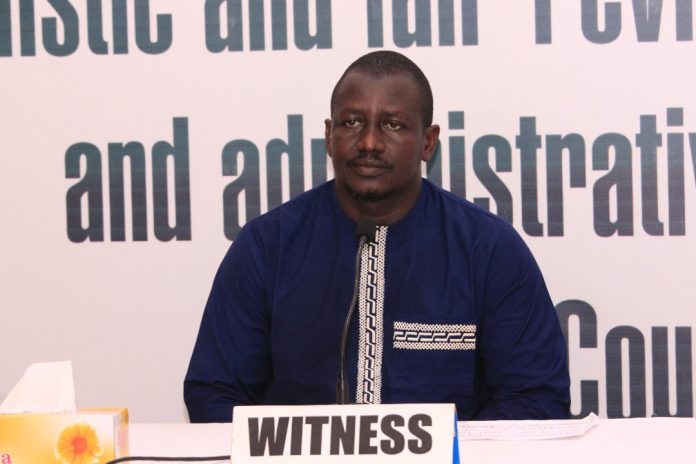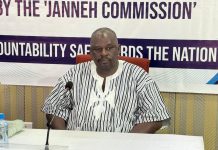By Yankuba Jallow
Landing B. Sanneh, the chairman of the Mansakonko Area Council, appeared before the Local Government Commission of Inquiry on Monday and was questioned over his role in the management of COVID-19 donations, as the inquiry widened its probe into financial impropriety and weak oversight at local councils across the country.
Sanneh, who led the Lower River Region’s council from 2018 to date, told the commission that he initiated the COVID-19 taskforce during the pandemic to coordinate donations and aid distribution in the region. He explained that the taskforce, though composed of top council officials, operated with some degree of independence and was intended to mobilize external support to address urgent public health and food security needs.
“There were two chairmen — one in the Diaspora and one in The Gambia — and I was a member because I initiated the taskforce and needed to monitor the funds,” Sanneh said. “I was the initiator and shared the idea with the CEO and members of the council.”
But lead counsel Patrick Gomez swiftly challenged Sanneh’s characterization, citing the Local Government Financial Manual, which clearly states that donations received through any structure affiliated with the council must be treated as part of the council’s revenue.
“You cannot exclude the council from the taskforce,” Gomez said, pointing out that the group included the three most powerful figures in the administration — the chairman, the CEO, and the finance director — and that donors, including the Israeli Embassy, were engaging them because of their positions in the council.
Sanneh eventually conceded the point: “Yes, the taskforce was not a private initiative,” he admitted. “I get it.”
The inquiry revealed that D1 million was transferred from the COVID-19 taskforce account into the council’s main account. When asked about this, Sanneh said he did not sign any cheques related to the COVID-19 account and described his role as “ceremonial.”
“I was only there ceremonially,” he said, distancing himself from the fund’s administration.
But Gomez pressed him further, revealing that over D1 million was paid to Nema-su Enterprise for food aid during the pandemic, including rice, oil, and sugar. Sanneh acknowledged that he was familiar with Nema-su and its representative, Almamo Dibba, before the transaction but insisted he had no hand in the awarding of the contract.
He claimed that the Government Public Procurement Authority (GPPA) had misrepresented the cost of the food items. But when the commission ran the numbers, it showed clear evidence of overpayment. According to Sanneh’s own calculations presented on the stand, Nema-su was paid D1,179,100, which included an overpayment of more than D100,000. Gomez took it further, reviewing invoices against payments and finding discrepancies totaling over D400,000.
“Even by your own figures, there was overpayment,” Gomez said.
The commission heard that the procurement was not handled by the council’s contracts committee, despite Sanneh’s claim. Gomez revealed it was managed by former CEO Pa Sait Ceesay and the procurement officer, bypassing internal oversight structures.
The commission has now asked Sanneh to produce the full account statement for the COVID-19 fund, as well as a breakdown of how the D1 million transfer into the council’s general account was spent.
The inquiry also questioned Sanneh about the practice of revenue collectors spending funds before banking them — a procedure reportedly authorized by the council’s CEO and finance director. Sanneh said he was unaware of this. Additionally, Gomez pointed out that the council had no petty cash or imprest system in place, both of which are basic financial tools to track small expenditures. Sanneh responded that the council only addressed this issue last year.
Commission Chairperson Jainaba Bah expressed frustration with the pattern of reforms coming only after public investigations. “We cannot wait for commissions of inquiry to correct the system,” she said pointedly.
“I agree with you,” Sanneh replied.
Sanneh, at times defensive and reflective, said many of the problems predated his leadership. He explained that the council’s challenges were rooted in inherited dysfunction, poor staffing, and an entrenched work culture.
“What we found in the council — even if we wanted to change it, we would not be able to,” he said. “You cannot give what you do not have.”



















